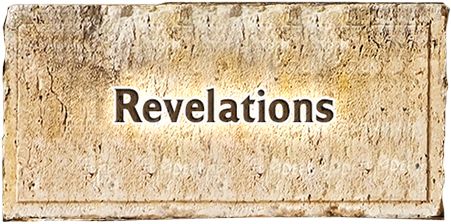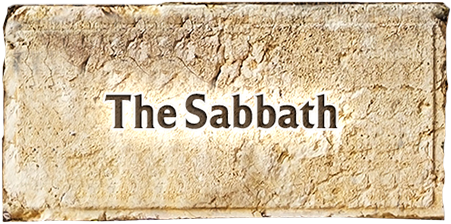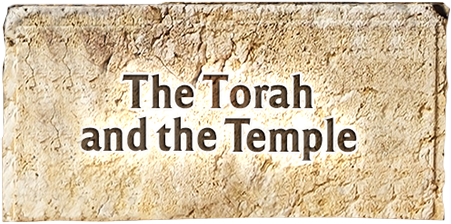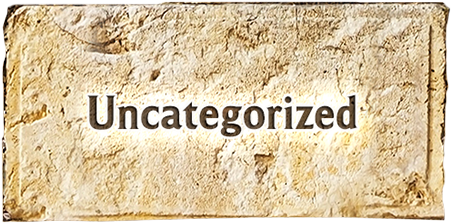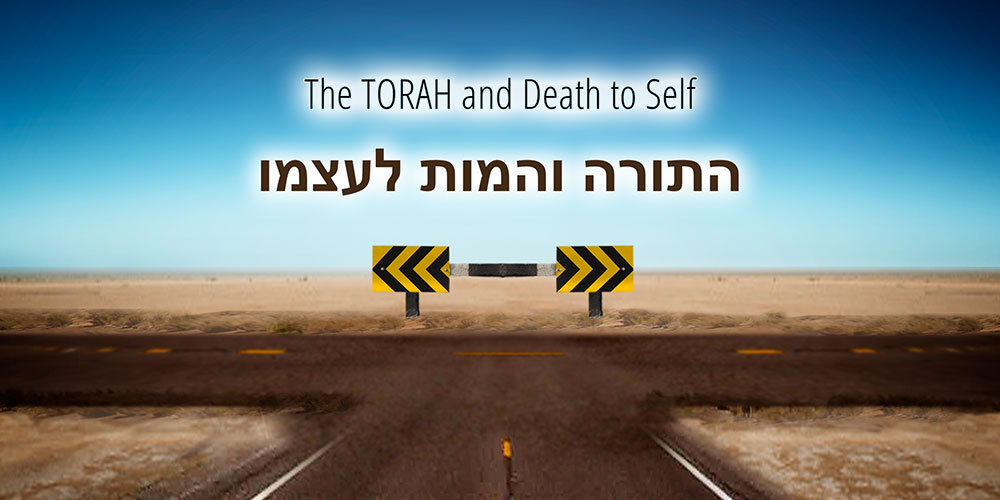The TORAH and Death to Self
התורה והמות לעצמו
When HASHEM descended upon Mount Sinai in His power, and in His awesome and fearful glory, the people made an amazing plea to Moses:
And all the people saw the voices and the torches, the sound of the shofar, and the smoking mountain, and the people saw and trembled; so they stood from afar.
They said to Moses, “You speak with us, and we will hear, but let God not speak with us lest we die.”
וְכָל הָעָם רֹאִים אֶת הַקּוֹלֹת וְאֶת הַלַּפִּידִם וְאֵת קוֹל הַשֹּׁפָר וְאֶת הָהָר עָשֵׁן וַיַּרְא הָעָם וַיָּנֻעוּ וַיַּעַמְדוּ מֵרָחֹק:
וַיֹּאמְרוּ אֶל משֶׁה דַּבֶּר אַתָּה עִמָּנוּ וְנִשְׁמָעָה וְאַל יְדַבֵּר עִמָּנוּ אֱלֹהִים פֶּן נָמוּת
Exodus 20:18-19 (15-16)
This request made such an impression upon Moses that he repeated it in great detail towards the end of his life to the children of all the people who pleaded with him.
The Lord spoke these words to your entire assembly at the mountain out of the midst of the fire, the cloud, and the opaque darkness, with a great voice, which did not cease. And He inscribed them on two stone tablets and gave them to me.
And it was, when you heard the voice from the midst of the darkness, and the mountain was burning with fire, that you approached me, all the heads of your tribes and your elders.
And you said, “Behold, the Lord, our God, has shown us His glory and His greatness, and we heard His voice from the midst of the fire; we saw this day that God speaks with man, yet [man] remains alive.
So now, why should we die? For this great fire will consume us; if we continue to hear the voice of the Lord, our God, anymore, we will die.
אֶת הַדְּבָרִים הָאֵלֶּה דִּבֶּר יְהֹוָה אֶל כָּל קְהַלְכֶם בָּהָר מִתּוֹךְ הָאֵשׁ הֶעָנָן וְהָעֲרָפֶל קוֹל גָּדוֹל וְלֹא יָסָף וַיִּכְתְּבֵם עַל שְׁנֵי לֻחֹת אֲבָנִים וַיִּתְּנֵם אֵלָי
וַיְהִי כְּשָׁמְעֲכֶם אֶת הַקּוֹל מִתּוֹךְ הַחשֶׁךְ וְהָהָר בֹּעֵר בָּאֵשׁ וַתִּקְרְבוּן אֵלַי כָּל רָאשֵׁי שִׁבְטֵיכֶם וְזִקְנֵיכֶם
וַתֹּאמְרוּ הֵן הֶרְאָנוּ יְהֹוָה אֱלֹהֵינוּ אֶת כְּבֹדוֹ וְאֶת גָּדְלוֹ וְאֶת קֹלוֹ שָׁמַעְנוּ מִתּוֹךְ הָאֵשׁ הַיּוֹם הַזֶּה רָאִינוּ כִּי יְדַבֵּר אֱלֹהִים אֶת הָאָדָם וָחָי
וְעַתָּה לָמָּה נָמוּת כִּי תֹאכְלֵנוּ הָאֵשׁ הַגְּדֹלָה הַזֹּאת אִם יֹסְפִים |
אֲנַחְנוּ לִשְׁמֹעַ אֶת קוֹל יְהֹוָה אֱלֹהֵינוּ עוֹד וָמָתְנוּ
Deuteronomy 5:21-22 (24-25)
The people did not want to hear the voice of HASHEM for themselves, because they thought the voice of HASHEM would cause them to die. This request grieved Moses in his heart. It was against everything he desired for the children of Israel. For Moses revealed the desire of his heart for Israel when he said before Joshua and the elders of Israel:
Moses said to him, “Are you zealous for my sake? If only ALL the Lord’s people were prophets, that the Lord would bestow His Spirit upon them!”
וַיֹּאמֶר לוֹ משֶׁה הַמְקַנֵּא אַתָּה לִי וּמִי יִתֵּן כָּל עַם יְהֹוָה נְבִיאִים כִּי יִתֵּן יְהֹוָה אֶת רוּחוֹ עֲלֵיהֶם
Numbers 11:29 במדבר יא:כט
Moses knew that the glory of HASHEM kills the glory of self by overshadowing it and putting it to death, thereby extinguishing it. The people were essentially saying to Moses: “You allow the glory of HASHEM to kill your glory to yourself, but we don’t want to die to the glory of ourselves; we don’t want the glory of HASHEM to overshadow and to put to death the glory of self in us. We cling to that glory. Moses knew that this was a critical point to keeping the TORAH and the commandments of HASHEM. It was the pivotal point.
The Messiah repeats this point and highlights it when he says:
“If any man would be my talmid תלמיד or disciple, HE MUST DENY HIMSELF.”
The ascendency of self, or the glory of self is opposed to the TORAH. There is a dichotomy between it and the TORAH. It is at enmity with the commandments of HASHEM. The glory of self, with its propensities and predilections, its prejudices and judgments, the force of the ego, and the yetzer ha ra יצר חרע (evil inclination) asserts itself over the commands of HASHEM.
This is why the request of the people of Israel that HASHEM would not speak directly to them, but rather that He would speak only to Moses did not flatter Moses. It grieved him.
This was the pivotal point or focal fulcrum point at which Israel began to backslide.
Only shortly after this, when Moses was so long in the mount, they desired Aaron to make them a molten calf, and make it golden.
Moses was the meekest man on the face of the earth. He allowed the glory of HASHEM to consume him.
Later the Messiah said that those who follow after Him must allow the glory of HASHEM to consume them. The Messiah is the one to whom Moses referred when Moses prophesied that HASHEM would raise up one who would be like himself. Moses said that the person who would not listen to the Messiah, HASHEM would require it of him.
I will set up a prophet for them from among their brothers like you, and I will put My words into his mouth, and he will speak to them all that I command him.
And it will be, that whoever does not hearken to My words that he speaks in My name, I will exact [it] of him.
נָבִיא אָקִים לָהֶם מִקֶּרֶב אֲחֵיהֶם כָּמוֹךָ וְנָתַתִּי דְבָרַי בְּפִיו וְדִבֶּר אֲלֵיהֶם אֵת כָּל אֲשֶׁר אֲצַוֶּנּוּ
וְהָיָה הָאִישׁ אֲשֶׁר לֹא יִשְׁמַע אֶל דְּבָרַי אֲשֶׁר יְדַבֵּר בִּשְׁמִי אָנֹכִי אֶדְרשׁ מֵעִמּוֹ
Deuteronomy 18:18-19 דברים יח:יח-יט
We will examine some of the laws and commandments of the TORAH, and see how it requires a man or a woman to deny himself or herself in order to obey the laws and commandments of HASHEM and allow the fire and the glory of HASHEM to consume them.
- Exodus 23:4-5 שמות כג:ד-ה
If you come upon your enemy’s bull or his stray donkey, you shall surely return it to him.
If you see your enemy’s donkey lying under its burden would you refrain from helping him? You shall surely help along with him.
כִּי תִפְגַּע שׁוֹר אֹיִבְךָ אוֹ חֲמֹרוֹ תֹּעֶה הָשֵׁב תְּשִׁיבֶנּוּ לוֹ
כִּי תִרְאֶה חֲמוֹר שׂנַאֲךָ רֹבֵץ תַּחַת מַשָּׂאוֹ וְחָדַלְתָּ מֵעֲזֹב לוֹ עָזֹב תַּעֲזֹב עִמּוֹ
This commandment מצוה runs contrary to a person’s natural predilections, feelings, reasonings, and tendencies, because the individual that you are commanded to help is your enemy! In order to keep this mitzvah מצוה of the Torah you have to deny yourself.
- Leviticus 19:16 ויקרא יט:טז
You shall not go around as a gossipmonger amidst your people. You shall not stand by [the shedding of] your fellow’s blood. I am the Lord.
לֹא תִשְׂנָא אֶת אָחִיךָ בִּלְבָבֶךָ הוֹכֵחַ תּוֹכִיחַ אֶת עֲמִיתֶךָ וְלֹא תִשָּׂא עָלָיו חֵטְא
There is a natural tendency among many people to engage in gossip. Especially if it happens with a group of friends, not to partake in the talk about the latest news can have the effect of isolating you from their company. It also could make you unpopular. In order to keep this mitzvah מצוה of the Torah about gossiping, you have to deny yourself.
- Leviticus 19:17 ויקרא יט:יז
You shall not hate your brother in your heart. You shall surely rebuke your neighbor, and not suffer sin upon him.
לֹא תִשְׂנָא אֶת אָחִיךָ בִּלְבָבֶךָ הוֹכֵחַ תּוֹכִיחַ אֶת עֲמִיתֶךָ וְלֹא תִשָּׂא עָלָיו חֵטְא
It is often seemingly much easier to keep quiet and not say anything, when you see someone you know committing a sin. If you rebuke that person, you run the risk of incurring his or her wrath, criticism, or even ostracism. Sometimes it is socially unacceptable to rebuke sin. In order to keep this mitzvah מצוה of the Torah you have to deny your own self interests. You have to deny yourself.
- Leviticus 19:18 ויקרא יט:יח
You shall neither take revenge from nor bear a grudge against the members of your people; you shall love your neighbor as yourself. I am the Lord.
לֹא תִקֹּם וְלֹא תִטֹּר אֶת בְּנֵי עַמֶּךָ וְאָהַבְתָּ לְרֵעֲךָ כָּמוֹךָ אֲנִי יְהוָֹה
It is easy to carry a grudge against someone who has wronged you, or done harm to you in one way or another. This is especially true if that person is close to you, or a member of your family.
In order to forgive that person, and to forget the offense, and to not hold it against him or her, you have to deny yourself.
- Deuteronomy 21:15-17 דברים כא:טו-יז
If a man has two wives-one beloved and the other hated-and they bear him sons, the beloved one and the despised one, and the firstborn son is from the hated one.
Then it will be, on the day he [the husband] bequeaths his property to his sons, that he will not be able to give the son of the beloved [wife] birthright precedence over the son of the hated [wife]-the [real] firstborn son.
Rather, he must acknowledge the firstborn, the son of the hated wife, and give him a double share in all that he possesses, because he [this firstborn son] is the first of his strength, then he has the birthright entitlement.
כִּי תִהְיֶיןָ לְאִישׁ שְׁתֵּי נָשִׁים הָאַחַת אֲהוּבָה וְהָאַחַת שְׂנוּאָה וְיָלְדוּ לוֹ בָנִים הָאֲהוּבָה וְהַשְּׂנוּאָה וְהָיָה הַבֵּן הַבְּכֹר לַשְּׂנִיאָה
וְהָיָה בְּיוֹם הַנְחִילוֹ אֶת בָּנָיו אֵת אֲשֶׁר יִהְיֶה לוֹ לֹא יוּכַל לְבַכֵּר אֶת בֶּן הָאֲהוּבָה עַל פְּנֵי בֶן הַשְּׂנוּאָה הַבְּכֹר
כִּי אֶת הַבְּכֹר בֶּן הַשְּׂנוּאָה יַכִּיר לָתֶת לוֹ פִּי שְׁנַיִם בְּכֹל אֲשֶׁר יִמָּצֵא לוֹ כִּי הוּא רֵאשִׁית אֹנוֹ לוֹ מִשְׁפַּט הַבְּכֹרָה
The man must rigorously deny himself to give the birthright to the son of the hated wife and thus keep the judgment משפט of the Torah. His passion and love would be towards the son of the beloved wife. He must deny his prejudices.
- Leviticus 19:35-36 ויקרא יט:גה-גו
You shall not commit a perversion of justice (unrighteousness) with measures, weights, or liquid measures.
You shall have true scales, true weights, a true ephah, and a true hin. I am the Lord, your God, Who brought you out of the land of Egypt.
לֹא תַעֲשׂוּ עָוֶל בַּמִּשְׁפָּט בַּמִּדָּה בַּמִּשְׁקָל וּבַמְּשׂוּרָה
מֹאזְנֵי צֶדֶק אַבְנֵי צֶדֶק אֵיפַת צֶדֶק וְהִין צֶדֶק יִהְיֶה לָכֶם אֲנִי יְהוָֹה אֱלֹהֵיכֶם אֲשֶׁר הוֹצֵאתִי אֶתְכֶם מֵאֶרֶץ מִצְרָיִם
Self-interest is ensconced in the human heart. Greed is the progeny of self-interest. A person with this predilection can be enticed to think that a false balance is the way to get the advantage and to prosper. In order to keep the judgment משפט of the Torah, he must deny himself.
- Leviticus 19:15 ויקרא יט:טו Exodus 23:3,6 ו , תשמות כג:ג
You shall commit no injustice in judgment; you shall not favor a poor person or respect a great man; you shall judge your fellow with righteousness.
לֹא תַעֲשׂוּ עָוֶל בַּמִּשְׁפָּט לֹא תִשָּׂא פְנֵי דָל וְלֹא תֶהְדַּר פְּנֵי גָדוֹל בְּצֶדֶק תִּשְׁפֹּט עֲמִיתֶךָ
Neither shall you glorify a poor man in his lawsuit.
וְדָל לֹא תֶהְדַּר בְּרִיבוֹ
You shall not pervert the judgment of a poor man in his lawsuit.
לֹא תַטֶּה מִשְׁפַּט אֶבְיֹנְךָ בְּרִיבוֹ
Because of teachings and doctrines, and predilections in the human heart, a person who sits in the seat of judgment could prefer the rich over the poor, or the poor over the rich. But HASHEM commands against preferences. He hates preferences in judgment. It is avel אול , or perversion.
To keep the judgment of HASHEM, a person must deny his or her predilections or preferences.
- Leviticus 19:8 ויקרא יט:ח
You shall not accept a bribe, for a bribe will blind the clear sighted and corrupts words that are right (or perverts the words of the righteous).
וְשֹׁחַד לֹא תִקָּח כִּי הַשֹּׁחַד יְעַוֵּר פִּקְחִים וִיסַלֵּף דִּבְרֵי צַדִּיקִים
Again because self-interest is so entrenched in the human heart, a gift which is a bribe, or a flattery, especially if the gift is a large one, can be a temptation. In order to keep this judgment משפט of the Torah, you have to deny yourself.
- Exodus 23:2 ב :שמות כג
You shall not follow the majority for evil, or go with a multitude to do evil, and you shall not decline and follow with many to pervert [justice].
לֹא תִהְיֶה אַחֲרֵי רַבִּים לְרָעֹת וְלֹא תַעֲנֶה עַל רִב לִנְטֹת אַחֲרֵי רַבִּים לְהַטֹּת
There is a strong tendency in the human heart to follow the crowd and to be caught up in the hysteria of the multitude to do evil.This need to be accepted and to be part of the majority has to be resisted.You have to deny yourself.
- Leviticus 19:13 ויקרא יט:יג
You shall not oppress your neighbor. You shall not rob. The hired worker’s wage shall not remain with you overnight until morning.
לֹא תַעֲשֹׁק אֶת רֵעֲךָ וְלֹא תִגְזֹל לֹא תָלִין פְּעֻלַּת שָׂכִיר אִתְּךָ עַד בֹּקֶר
Deuteronomy 24:14-15דברים כד:יד-טו
You shall not withhold the wages of a poor or destitute hired worker, of your brothers or of your strangers who are in your land within your cities.
You shall give him his wage on his day and not let the sun set over it, for he is poor, and he set his heart on it, so that he should not cry out to the Lord against you, so that there should be sin upon you.
לֹא תַעֲשֹׁק שָׂכִיר עָנִי וְאֶבְיוֹן מֵאַחֶיךָ אוֹ מִגֵּרְךָ אֲשֶׁר בְּאַרְצְךָ בִּשְׁעָרֶיךָ
בְּיוֹמוֹ תִתֵּן שְׂכָרוֹ וְלֹא תָבוֹא עָלָיו הַשֶּׁמֶשׁ כִּי עָנִי הוּא וְאֵלָיו הוּא נֹשֵׂא אֶת נַפְשׁוֹ וְלֹא יִקְרָא עָלֶיךָ אֶל יְהֹוָה וְהָיָה בְךָ חֵטְא
Because self-interest is strong in the human heart, there is a tendency or a proclivity to withhold payment from those who work for you and to oppress laborers.It is a precept in the Torah NOT to do this.You have to deny yourself.
- Exodus 21:18-19 שמות כא:יח-יט
And if men quarrel, and one strikes the other with a stone or with a fist, and he does not die but is confined to [his] bed,
if he gets up and walks about outside on his support, the assailant shall be cleared; he shall give only [payment] for his [enforced] idleness, and he shall provide for his cure.
וְכִי יְרִיבֻן אֲנָשִׁים וְהִכָּה אִישׁ אֶת רֵעֵהוּ בְּאֶבֶן אוֹ בְאֶגְרֹף וְלֹא יָמוּת וְנָפַל לְמִשְׁכָּב
אִם יָקוּם וְהִתְהַלֵּךְ בַּחוּץ עַל מִשְׁעַנְתּוֹ וְנִקָּה הַמַּכֶּה רַק שִׁבְתּוֹ יִתֵּן וְרַפֹּא יְרַפֵּא
This precept of the Torah is about the last thing a man wants to do.This requires him to pay for the medicine, treatment, and hospital stay of his adversary, even if his adversary started the quarrel. Here the man must really die to himself, and deny himself
in order to keep this precept of the Torah. פקודת תורה
- Exodus 21:26-27 שמות כא:כו-כז
And if a man strikes the eye of his manservant or the eye of his maidservant and destroys it, he shall set him free in return for his eye
and if he knocks out the tooth of his manservant or the tooth of his maidservant, he shall set him free in return for his tooth.
וְכִי יַכֶּה אִישׁ אֶת עֵין עַבְדּוֹ אוֹ אֶת עֵין אֲמָתוֹ וְשִׁחֲתָהּ לַחָפְשִׁי יְשַׁלְּחֶנּוּ תַּחַת עֵינוֹ
וְאִם שֵׁן עַבְדּוֹ אוֹ שֵׁן אֲמָתוֹ יַפִּיל לַחָפְשִׁי יְשַׁלְּחֶנּוּ תַּחַת שִׁנּוֹ
This judgment משפטof the Torah rubs against the self-interest of master. He likes to think that he can do whatever he wants to do to his servants without penalty. In order to keep this judgment of the Torah, he has to deny himself.
- Exodus 22:25-26 שמות כב:כה-כו Deuteronomy 24:12-13 דברים יב-יג
If you take your neighbor’s garment as security, after sunset you shall return it to him,
for it is his only covering; it is his garment for his skin. With what shall he lie? And it shall be [that] if he cries out to Me, I will hear because I am gracious.
אִם חָבֹל תַּחְבֹּל שַׂלְמַת רֵעֶךָ עַד בֹּא הַשֶּׁמֶשׁ תְּשִׁיבֶנּוּ לוֹ
כִּי הִוא כְסוּתוֹ לְבַדָּהּ הִוא שִׂמְלָתוֹ לְעֹרוֹ בַּמֶּה יִשְׁכָּב וְהָיָה כִּי יִצְעַק אֵלַי וְשָׁמַעְתִּי כִּי חַנּוּן אָנִי
And if he is a poor man, you shall not lie down [to sleep] with his security.
You shall return the security to him by sunset, so that he may lie down [to sleep] in his garment, and he will bless you, and it will be counted for you as righteousness before the Lord, your God.
וְאִם אִישׁ עָנִי הוּא לֹא תִשְׁכַּב בַּעֲבֹטוֹ
הָשֵׁב תָּשִׁיב לוֹ אֶת הָעֲבוֹט כְּבוֹא הַשֶּׁמֶשׁ וְשָׁכַב בְּשַׂלְמָתוֹ וּבֵרֲכֶךָּ וּלְךָ תִּהְיֶה צְדָקָה לִפְנֵי יְהֹוָה אֱלֹהֶיךָ
Whenever you give a loan to someone, the security serves a hedge against the risk that the loan might not be repaid.Without the security the risk increases substantially that the person could walk away and not repay the loan.You have to deny yourself to give up the security
- Deuteronomy 24:17 דברים כד:יז Leviticus 19:33-34 ויקרא יט: לג-לד
You shall not pervert the judgment of a stranger or an orphan, and you shall not take a widow’s garment as security [for a loan] .
לֹא תַטֶּה מִשְׁפַּט גֵּר יָתוֹם וְלֹא תַחֲבֹל בֶּגֶד אַלְמָנָה
When a stranger sojourns with you in your land, you shall not taunt him.
The stranger who sojourns with you shall be as a native from among you, and you shall love him as yourself; for you were strangers in the land of Egypt. I am the Lord, your God.
וְכִי יָגוּר אִתְּךָ גֵּר בְּאַרְצְכֶם לֹא תוֹנוּ אֹתוֹ
כְּאֶזְרָח מִכֶּם יִהְיֶה לָכֶם הַגֵּר | הַגָּר אִתְּכֶם וְאָהַבְתָּ לוֹ כָּמוֹךָ כִּי גֵרִים הֱיִיתֶם בְּאֶרֶץ מִצְרָיִם אֲנִי יְהוָֹה אֱלֹהֵיכֶם
Strangers, widows, and orphans are relatively defenseless groups of people, and are therefore groups of whom it is relatively easy to take advantage.The Torah says “Don’t do It!”A person must deny all selfish (and savage) instincts.
- Deuteronomy 24:19-22 דברים כד:יט-כב
When you reap your harvest in your field and forget a sheaf in the field, you shall not go back to take it; it shall be [left] for the stranger, the orphan, and the widow, so that the Lord, your God, will bless you in all that you do.
When you beat your olive tree, you shall not deglorify it [by picking all its fruit] after you; it shall be [left] for the stranger, the orphan and the widow.
When you pick the grapes of your vineyard, you shall not glean after you: it shall be [left] for the stranger, the orphan and the widow
You shall remember that you were a slave in the land of Egypt: therefore, I command you to do this thing.
כִּי תִקְצֹר קְצִירְךָ בְשָׂדֶךָ וְשָׁכַחְתָּ עֹמֶר בַּשָּׂדֶה לֹא תָשׁוּב לְקַחְתּוֹ לַגֵּר לַיָּתוֹם וְלָאַלְמָנָה יִהְיֶה לְמַעַן יְבָרֶכְךָ יְהֹוָה אֱלֹהֶיךָ בְּכֹל מַעֲשֵׂה יָדֶיךָ
כִּי תַחְבֹּט זֵיתְךָ לֹא תְפַאֵר אַחֲרֶיךָ לַגֵּר לַיָּתוֹם וְלָאַלְמָנָה יִהְיֶה
כִּי תִבְצֹר כַּרְמְךָ לֹא תְעוֹלֵל אַחֲרֶיךָ לַגֵּר לַיָּתוֹם וְלָאַלְמָנָה יִהְיֶה
וְזָכַרְתָּ כִּי עֶבֶד הָיִיתָ בְּאֶרֶץ מִצְרָיִם עַל כֵּן אָנֹכִי מְצַוְּךָ לַעֲשׂוֹת אֶת הַדָּבָר הַזֶּה
Leaving remnants of crops behind mean less profits for the owner of the fields, the olive trees, and the vineyards.It means leaving an opportunity to maximize profits.The owner has to deny himself in order to keep the testimonies of the Torah.
- Exodus 22:24 שמות כב:כד
When you lend money to My people, to the poor person [who is] with you, you shall not behave toward him as a lender; you shall not impose interest (usury) upon him.
אִם כֶּסֶף | תַּלְוֶה אֶת עַמִּי אֶת הֶעָנִי עִמָּךְ לֹא תִהְיֶה לוֹ כְּנשֶׁה
לֹא תְשִׂימוּן עָלָיו נֶשֶׁךְ
Leviticus 25:35-37 ויקרא כה:לה-לז
If your brother becomes destitute and his hand falters beside you, you shall support him [whether] a convert or a resident, so that he can live with you.
You shall not take from him interest (usury) or increase, and you shall fear your God, and let your brother live with you.
You shall not give him your money with interest (usury), nor shall you give your food with increase.
וְכִי יָמוּךְ אָחִיךָ וּמָטָה יָדוֹ עִמָּךְ וְהֶחֱזַקְתָּ בּוֹ גֵּר וְתוֹשָׁב וָחַי עִמָּךְ
אַל תִּקַּח מֵאִתּוֹ נֶשֶׁךְ וְתַרְבִּית וְיָרֵאתָ מֵאֱלֹהֶיךָ וְחֵי אָחִיךָ עִמָּךְ
אֶת כַּסְפְּךָ לֹא תִתֵּן לוֹ בְּנֶשֶׁךְ וּבְמַרְבִּית לֹא תִתֵּן אָכְלֶךָ
Deuteronomy 23:20 דברים כג:
You shall not give interest (usury) to your brother, [whether it be] interest (usury) on money, interest (usury)on food or interest (usury) on any [other] item for which interest is [normally] taken.
לֹא תַשִּׁיךְ לְאָחִיךָ נֶשֶׁךְ כֶּסֶף נֶשֶׁךְ אֹכֶל נֶשֶׁךְ כָּל דָּבָר אֲשֶׁר יִשָּׁךְ
The Torah forbids usury to be put on money or any items that are lent to a brother. Interest payments are one of the primary means by which a lender can make money. In order to obey the Lawחוק of the Torah, the lender must forego all interest payments.
The lender must deny himself.
- Part A: Leviticus 25:1-7 ויקרא כה:א-ז The Seventh Year Sabbath for the Land
And the Lord spoke to Moses on Mount Sinai, saying,
Speak to the children of Israel and you shall say to them: When you come to the land that I am giving you, the land shall rest a Sabbath to the Lord.
You may sow your field for six years, and for six years you may prune your vineyard, and gather in its produce,
But in the seventh year, the land shall have a complete rest a Sabbath to the Lord; you shall not sow your field, nor shall you prune your vineyard.
You shall not reap the after growth of your harvest, and you shall not pick the grapes you had set aside [for yourself], [for] it shall be a year of rest for the land.
And [the produce of] the Sabbath of the land shall be yours to eat for you, for your male and female slaves, and for your hired worker and resident who live with you,
And all of its produce may be eaten [also] by your domestic animals and by the beasts that are in your land.
וַיְדַבֵּר יְהֹוָה אֶל משֶׁה בְּהַר סִינַי לֵאמֹר
דַּבֵּר אֶל בְּנֵי יִשְׂרָאֵל וְאָמַרְתָּ אֲלֵהֶם כִּי תָבֹאוּ אֶל הָאָרֶץ אֲשֶׁר אֲנִי נֹתֵן לָכֶם וְשָׁבְתָה הָאָרֶץ שַׁבָּת לַיהֹוָה
שֵׁשׁ שָׁנִים תִּזְרַע שָׂדֶךָ וְשֵׁשׁ שָׁנִים תִּזְמֹר כַּרְמֶךָ וְאָסַפְתָּ אֶת תְּבוּאָתָהּ
וּבַשָּׁנָה הַשְּׁבִיעִת שַׁבַּת שַׁבָּתוֹן יִהְיֶה לָאָרֶץ שַׁבָּת לַיהֹוָה שָׂדְךָ לֹא תִזְרָע וְכַרְמְךָ לֹא תִזְמֹר
אֵת סְפִיחַ קְצִירְךָ לֹא תִקְצוֹר וְאֶת עִנְּבֵי נְזִירֶךָ לֹא תִבְצֹר שְׁנַת שַׁבָּתוֹן יִהְיֶה לָאָרֶץ
וְהָיְתָה שַׁבַּת הָאָרֶץ לָכֶם לְאָכְלָה לְךָ וּלְעַבְדְּךָ וְלַאֲמָתֶךָ וְלִשְׂכִירְךָ וּלְתוֹשָׁבְךָ הַגָּרִים עִמָּךְ
וְלִבְהֶמְתְּךָ וְלַחַיָּה אֲשֶׁר בְּאַרְצֶךָ תִּהְיֶה כָל תְּבוּאָתָהּ לֶאֱכֹל
The seventh year Sabbath for the land is a testimony and a law that HASHEM proscribed at Mount Sinai. But this law of the Torah requires that a man dies to himself. He has to die to all his desire for gain for that year. He has to endure the interruption of produce from his fields for two and a half years. This is considerable hiatus to his own ambition to succeed and profit from his endeavors and his business. Moreover he has to feed his workers and all those around him, including beasts, who rely on the produce from the land. If a man will not die to himself and deny himself, he will not keep this law of the Torah.
- Part B: The Seventh Year Release
Exodus 21:1-3 שמות כא:א-ג
And these are the ordinances that you shall set before them.
Should you buy a Hebrew slave, he shall work [for] six years, and in the seventh [year], he shall go out to freedom without charge.
If he comes [in] alone, he shall go out alone; if he is a married man, his wife shall go out with him.
וְאֵלֶּה הַמִּשְׁפָּטִים אֲשֶׁר תָּשִׂים לִפְנֵיהֶם
כִּי תִקְנֶה עֶבֶד עִבְרִי שֵׁשׁ שָׁנִים יַעֲבֹד וּבַשְּׁבִעִת יֵצֵא לַחָפְשִׁי חִנָּם
אִם בְּגַפּוֹ יָבֹא בְּגַפּוֹ יֵצֵא אִם בַּעַל אִשָּׁה הוּא וְיָצְאָה אִשְׁתּוֹ עִמּוֹ
Deuteronomy 15:1-3 דברים טו:א-ג
The Release-Shmittah שמיטה
At the end of seven years you will make a release.
And this is the manner of the release; to release the hand of every creditor from what he lent his friend; he shall not exact from his friend or his brother, because time of the release for the Lord has arrived.
From the foreigner you may exact; but what is yours with your brother, your hand shall release.
מִקֵּץ שֶׁבַע שָׁנִים תַּעֲשֶׂה שְׁמִטָּה
וְזֶה דְּבַר הַשְּׁמִטָּה שָׁמוֹט כָּל בַּעַל מַשֵּׁה יָדוֹ אֲשֶׁר יַשֶּׁה בְּרֵעֵהוּ לֹא יִגֹּשׂ אֶת רֵעֵהוּ וְאֶת אָחִיו כִּי קָרָא שְׁמִטָּה לַיהֹוָה
אֶת הַנָּכְרִי תִּגֹּשׂ וַאֲשֶׁר יִהְיֶה לְךָ אֶת אָחִיךָ תַּשְׁמֵט יָדֶךָ
The Seventh Year Release requires a huge death to self. If a master had a Hebrew servant, he had to let that servant go with his possessions. This could be a huge set back and inconvenience for his business, his property, or whatever the servant was doing to augment the wealth and well- being of his master. In order to keep this judgment משפט of the Torah, the master has to deny himself.
In the Smittah שמיטה the lender was required to relinquish ALL debts that were owed to him from fellow Jews. This could amount to huge financial losses. These losses could be augmented if the finances were invested in profitable enterprises. The lender would have to kill, put to death all his self interest in these matters. To keep this law משפט of the Torah, required a major death to self.
Through the Prophet Jeremiah, HASHEM required the Zedekiah the king at Jerusalem and the people at Jerusalem to keep this law משפט of the Torah. They kept it at first, but they did not die to themselves, and they turned again to serve themselves and their self interests, against the commandment of HASHEM. This had very dire consequences.
Jeremiah 34:8-21 ירמיה לד:ח-כא
The word that came to Jeremiah from the Lord after King Zedekiah had made a covenant with all the people who were in Jerusalem, to proclaim freedom to them;
That every man should let his manservant and every man his maidservant, a Jew and a Jewess go free, that none should hold his Jewish brother as a slave.
Now all the princes and all the people who had entered into the covenant hearkened that every one should let his manservant and everyone his maidservant go free, no longer holding them in slavery; then they obeyed and let them go.
But afterwards they turned and brought back the manservants and the maidservants whom they had let free, and forcibly made them into manservants and maidservants.
Then the word of the Lord came to Jeremiah from the Lord, saying:
So says the Lord God of Israel; I made a covenant with your fathers on the day that I brought them forth out of the land of Egypt, out of the house of slaves, saying:
“At the end of seven years you shall let go every man his brother Jew who has been sold to you, and when he has served you for six years you shall let him go free from you”; but your forefathers did not obey Me, nor did they incline their ear[s].
And now this day you turned and did what was right in My sight by proclaiming liberty every man to his neighbor, and you made a covenant before Me in the House upon which My Name is called.
But then you turned and profaned My Name, and you took back, each man his manservant and each man his maidservant, whom you had let free to themselves, and forced them to be manservants and maidservants to you.
Therefore, so says the Lord: You have not hearkened to Me to proclaim freedom, every one to his brother and every one to his neighbor; behold I proclaim freedom to you, says the Lord, to the sword, to the pestilence, and to the famine, and I will make you an object of horror to all the kingdoms of the earth.
And I will deliver the men who have transgressed My covenant, who have not kept the words of the covenant which they made before Me when they cut the calf in two and passed between its parts.
The princes of Judah, and the princes of Jerusalem, the officers and the priests, and all the people of the land who passed between the parts of the calf.
I will deliver them into the hand[s] of their enemies and into the hand[s] of those who seek their lives, and their dead bodies shall become food for the birds of the heavens and for the beasts of the earth.
And Zedekiah, king of Judah, and his princes I will deliver into the hand[s] of their enemies and into the hand[s] of those who seek their lives, and into the hand[s] of the army of the king of Babylon who have gone up away from you.
הַדָּבָר אֲשֶׁר הָיָה אֶל יִרְמְיָהוּ מֵאֵת יְהֹוָה אַחֲרֵי כְּרֹת הַמֶּלֶךְ צִדְקִיָּהוּ בְּרִית אֶת כָּל הָעָם אֲשֶׁר בִּירוּשָׁלִַם לִקְרֹא לָהֶם דְּרוֹר
לְשַׁלַּח אִישׁ אֶת עַבְדּוֹ וְאִישׁ אֶת שִׁפְחָתוֹ הָעִבְרִי וְהָעִבְרִיָּה חָפְשִׁים לְבִלְתִּי עֲבָד בָּם בִּיהוּדִי אָחִיהוּ אִישׁ
וַיִּשְׁמְעוּ כָל הַשָּׂרִים וְכָל הָעָם אֲשֶׁר בָּאוּ בַבְּרִית לְשַׁלַּח אִישׁ אֶת עַבְדּוֹ וְאִישׁ אֶת שִׁפְחָתוֹ חָפְשִׁים לְבִלְתִּי עֲבָד בָּם עוֹד וַיִּשְׁמְעוּ וַיְשַׁלֵּחוּ
וַיָּשׁוּבוּ אַחֲרֵי כֵן וַיָּשִׁיבוּ אֶת הָעֲבָדִים וְאֶת הַשְּׁפָחוֹת אֲשֶׁר שִׁלְּחוּ חָפְשִׁים וַיִּכְבְּשׁוּם לַעֲבָדִים וְלִשְׁפָחוֹת
וַיְהִי דְבַר יְהֹוָה אֶל יִרְמְיָהוּ מֵאֵת יְהֹוָה לֵאמֹר
כֹּה אָמַר יְהֹוָה אֱלֹהֵי יִשְׂרָאֵל אָנֹכִי כָּרַתִּי בְרִית אֶת אֲבוֹתֵיכֶם בְּיוֹם הוֹצִאִי אוֹתָם מֵאֶרֶץ מִצְרַיִם מִבֵּית עֲבָדִים לֵאמֹר
מִקֵּץ שֶׁבַע שָׁנִים תְּשַׁלְּחוּ אִישׁ אֶת אָחִיו הָעִבְרִי אֲשֶׁר יִמָּכֵר לְךָ וַעֲבָדְךָ שֵׁשׁ שָׁנִים וְשִׁלַּחְתּוֹ חָפְשִׁי מֵעִמָּךְ וְלֹא שָׁמְעוּ אֲבוֹתֵיכֶם אֵלַי וְלֹא הִטּוּ אֶת אָזְנָם
וַתָּשֻׁבוּ אַתֶּם הַיּוֹם וַתַּעֲשׂוּ אֶת הַיָּשָׁר בְּעֵינַי לִקְרֹא דְרוֹר אִישׁ לְרֵעֵהוּ וַתִּכְרְתוּ בְרִית לְפָנַי בַּבַּיִת אֲשֶׁר נִקְרָא שְׁמִי עָלָיו
וַתָּשֻׁבוּ וַתְּחַלְּלוּ אֶת שְׁמִי וַתָּשִׁבוּ אִישׁ אֶת עַבְדּוֹ וְאִישׁ אֶת שִׁפְחָתוֹ אֲשֶׁר שִׁלַּחְתֶּם חָפְשִׁים לְנַפְשָׁם וַתִּכְבְּשׁוּ אֹתָם לִהְיוֹת לָכֶם לַעֲבָדִים וְלִשְׁפָחוֹת
לָכֵן כֹּה אָמַר יְהֹוָה אַתֶּם לֹא שְׁמַעְתֶּם אֵלַי לִקְרֹא דְרוֹר אִישׁ לְאָחִיו וְאִישׁ לְרֵעֵהוּ הִנְנִי קֹרֵא לָכֶם דְּרוֹר נְאֻם יְהֹוָה אֶל הַחֶרֶב אֶל הַדֶּבֶר וְאֶל הָרָעָב וְנָתַתִּי אֶתְכֶם לְזַעֲוָה לְכֹל מַמְלְכוֹת הָאָרֶץ
וְנָתַתִּי אֶת הָאֲנָשִׁים הָעֹבְרִים אֶת בְּרִתִי אֲשֶׁר לֹא הֵקִימוּ אֶת דִּבְרֵי הַבְּרִית אֲשֶׁר כָּרְתוּ לְפָנָי הָעֵגֶל אֲשֶׁר כָּרְתוּ לִשְׁנַיִם וַיַּעַבְרוּ בֵּין בְּתָרָיו
שָׂרֵי יְהוּדָה וְשָׂרֵי יְרוּשָׁלִַם הַסָּרִסִים וְהַכֹּהֲנִים וְכֹל עַם הָאָרֶץ הָעֹבְרִים בֵּין בִּתְרֵי הָעֵגֶל
וְנָתַתִּי אוֹתָם בְּיַד אֹיְבֵיהֶם וּבְיַד מְבַקְשֵׁי נַפְשָׁם וְהָיְתָה נִבְלָתָם לְמַאֲכָל לְעוֹף הַשָּׁמַיִם וּלְבֶהֱמַת הָאָרֶץ
וְאֶת צִדְקִיָּהוּ מֶלֶךְ יְהוּדָה וְאֶת שָׂרָיו אֶתֵּן בְּיַד אֹיְבֵיהֶם וּבְיַד מְבַקְשֵׁי נַפְשָׁם וּבְיַד חֵיל מֶלֶךְ בָּבֶל הָעֹלִים מֵעֲלֵיכֶם
- Leviticus 25:8-13 ויקרא כה:ח-יג
And you shall count for yourself seven sabbatical years, seven years seven times. And the days of these seven sabbatical years shall amount to forty nine years for you.
You shall proclaim [with] the shofar blasts, in the seventh month, on the tenth of the month; on the Day of Atonement, you shall sound the shofar throughout your land.
And you shall sanctify the fiftieth year, and proclaim freedom [for slaves] throughout the land for all who live on it. It shall be a Jubilee for you, and you shall return, each man to his property,_ and you shall return, each man to his family.
This fiftieth year shall be a Jubilee for you you shall not sow, nor shall you reap its aftergrowth or pick [its grapes] that you had set aside [for yourself].
For it is Jubilee. It shall be holy for you; you shall eat its produce from the field.
During this Jubilee year, you shall return, each man to his property.
וְסָפַרְתָּ לְךָ שֶׁבַע שַׁבְּתֹת שָׁנִים שֶׁבַע שָׁנִים שֶׁבַע פְּעָמִים וְהָיוּ לְךָ יְמֵי שֶׁבַע שַׁבְּתֹת הַשָּׁנִים תֵּשַׁע וְאַרְבָּעִים שָׁנָה
וְהַעֲבַרְתָּ שׁוֹפַר תְּרוּעָה בַּחֹדֶשׁ הַשְּׁבִעִי בֶּעָשׂוֹר לַחֹדֶשׁ בְּיוֹם הַכִּפֻּרִים תַּעֲבִירוּ שׁוֹפָר בְּכָל אַרְצְכֶם
וְקִדַּשְׁתֶּם אֵת שְׁנַת הַחֲמִשִּׁים שָׁנָה וּקְרָאתֶם דְּרוֹר בָּאָרֶץ לְכָל ישְׁבֶיהָ יוֹבֵל הִוא תִּהְיֶה לָכֶם וְשַׁבְתֶּם אִישׁ אֶל אֲחֻזָּתוֹ וְאִישׁ אֶל מִשְׁפַּחְתּוֹ תָּשֻׁבוּ
יוֹבֵל הִוא שְׁנַת הַחֲמִשִּׁים שָׁנָה תִּהְיֶה לָכֶם לֹא תִזְרָעוּ וְלֹא תִקְצְרוּ אֶת סְפִיחֶיהָ וְלֹא תִבְצְרוּ אֶת נְזִרֶיהָ
כִּי יוֹבֵל הִוא קֹדֶשׁ תִּהְיֶה לָכֶם מִן הַשָּׂדֶה תֹּאכְלוּ אֶת תְּבוּאָתָהּ
בִּשְׁנַת הַיּוֹבֵל הַזֹּאת תָּשֻׁבוּ אִישׁ אֶל אֲחֻזָּתוֹ
This Ordinance, Judgment, Testimony, Statute, and Commandment of the Torah
חוק משפט עדות פקודה מצוה
contains perhaps the culmination of the requirement for every Israelite to die to self.
Not only do the landowners have to return all the property, but they have to forgive all the debts of their fellow countrymen. This could cause them tremendous financial loss. Then on top of that the fiftieth year היובל was a Sabbatical year, and they weren’t allowed to plant crops, or to do business during that year. To keep this commandment of the Torah the person had to completely die to self as Moses did. Israel in her history as a nation in the land never kept the Jubilee היובל.
Now we understand why the Messiah Yeshua המשיח ישוע said “Unless a man DENY HIMSELF…he CANNOT be my disciple.” תלמיד He was looking at Moses, the Torah, and the history of Israel.
He saw the root that started at Mount Sinai that had caused His people to fail to keep the Torah, and to be scattered among the Gentiles. He came to correct the problem. He is the greatest of all Rebbes. Being the Messish המשיח, He is the Rebbe of all Rebbes
As it is written: When the fullness of time was come, HASHEM sent forth His Son, born of a woman (seed of Abraham through David), made under the Torah, to redeem us who are under the Torah, that we might receive the adoption of sons. And because you are sons ,בני אלוהים
G-d אלוהים has sent forth the Spirit of His Son into your hearts, crying ABBA אבא Father.
Again it is written: As many as received Him, to them gave He the POWER to become the sons of G-d בני אלוהים .

